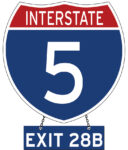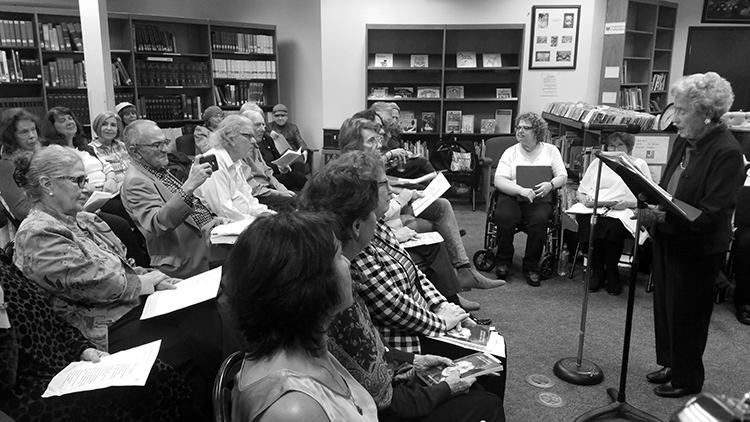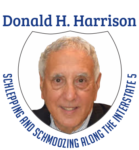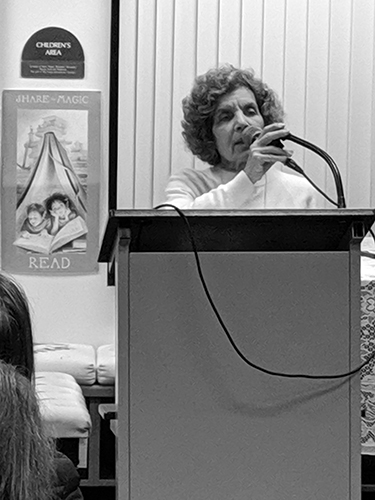 Editor’s Note: This is the 18th chapter in Volume 2 of Editor Emeritus Donald H. Harrison’s 2022 trilogy: “Schlepping and Schmoozing Along the Interstate 5.” All three books as well as others written by Harrison may be purchased from Amazon.com. Harrison may be contacted via donald.harrison@sdjewishworld.com.
Editor’s Note: This is the 18th chapter in Volume 2 of Editor Emeritus Donald H. Harrison’s 2022 trilogy: “Schlepping and Schmoozing Along the Interstate 5.” All three books as well as others written by Harrison may be purchased from Amazon.com. Harrison may be contacted via donald.harrison@sdjewishworld.com.
Schlepping and Schmoozing Along the Interstate 5, Exit 28B (La Jolla Village Drive): Lawrence Family JCC.
From northbound Interstate 5, take exit 28B (La Jolla Village Drive) and turn right. Follow to a left turn at Genesee Avenue. Make another left turn at Executive Drive. The Lawrence Family JCC, Jacobs Family campus, is at 4126 Executive Drive.

 LA JOLLA, California –– Four times a year on a weekday night, Jewish poets and poetry lovers convene in the Samuel & Rebecca Astor Library on the Jacobs Family Campus of the Lawrence Family JCC to recite or hear Jewish poems and songs.
LA JOLLA, California –– Four times a year on a weekday night, Jewish poets and poetry lovers convene in the Samuel & Rebecca Astor Library on the Jacobs Family Campus of the Lawrence Family JCC to recite or hear Jewish poems and songs.
Some participants are drawn to these seasonal convocations by an acrostic penned by Joy Heitzmann, moderator of the poetry evenings.

Just
Enough
Words to
Inspire
Soulful searching or sometimes
Heresy.
Poignant
Odes can
Entertain or produce
Tears.
Really!
You never know.
Heitzmann is a lover of Japanese haiku, which typically involves three lines with five, seven and five syllables for a total of 17 syllables “although sometimes I need that 18th syllable so it becomes a Chaiku!”
There previously had been one night of poetry read by Merle Fischlowitz well prior to 2008, the year the Jewish Poets/ Jewish Voices program was formally created. Heitzmann was joined by Jackie Gmach, who then directed cultural programming at the JCC, and Eileen Wingard, whom we met in the earlier chapter of this book about the San Diego Symphony.
These creative women decided to feature three Jewish poets at each evening session. Typically, the featured poets read their works, perhaps for 20 minutes apiece. Then a 30-minute “open mic” session follows at which anyone in the room may recite or read a poem, or even sing a song – lyrics being another form of poetry. The evenings are scheduled to conclude in 90 minutes. Such participants as Janice Alper, Sara Appel-Lennon, Bonnie Baron, Michael Horvitz, Leann Knetzer, and Michael Mark later joined the committee.
“The definition of Jewish poetry in my mind is that you are Jewish and you write,” Heitzmann told me. “It doesn’t have to be devoted to a Jewish theme, although usually there is a Jewish sensibility there.”
During the initial session of Jewish Poets/ Jewish Voices poems were read by Heitzmann; the late Holocaust survivor Sally Scheinok, who read in Yiddish; and the late Hal Wingard, a secular Jew who often set his satirical poems to music. For example, here in “Noah” Wingard imagined God giving advice in rhyme to Noah and his sons.
So pack up your belonging
And move out to the park
Cut the tallest timbers
And build a sturdy ark.
Then gather all that’s livin’
The animals and bugs,
Canaries, lambs and lions,
Cockroaches, snails, and slugs.
This I’ve got to tell you:
Be sure they come in pairs.
The way that I have planned it,
On board they’ll have affairs.
And let us give reminder
In interest of life
Whatever else you’re bringin’
Be sure to bring your wives.
So gather pairs together
And board them on your boat
Then when I cause a floodin’
Your ark will stay afloat …
The JCC being a place for Jews of every denomination, or none, to gather, poems on varied religious themes were welcomed at the poetry readings.
Heitzmann revealed that she takes particular joy in the open-mic portions of the programming. “For a while, I was religiously attending open-mic sessions throughout San Diego, but the ones I most enjoyed doing, stopped. There were some in Hillcrest and University Heights. The ones I most liked tended to be at bookstores or coffee houses. There was one that was held at Balboa Park, but they changed the date to a Friday night so I couldn’t go. But I haven’t been to any of those for a long time.”
For many JCC participants, she added, the open-mic portion is “a non-threatening opportunity with a Jewish audience where somebody who is perhaps shy and maybe has some Jewish-themed poetry is encouraged to actually read.” The JCC, she added, “is a known environment, a family. There are people you know, family, friends, neighbors. It takes a lot of guts to sign up for an open mic at a bookstore, coffee house or at Balboa Park. [The JCC] is a more sheltered environment.”
Heitzmann drew an analogy to a woman’s Torah study group at Ohr Shalom Synagogue that she had led for several years. “It was only for women, and it gave an opportunity for women who had never looked at a Torah, or touched a Torah, to ask ‘stupid questions’ that they would have been embarrassed to ask with men or a rabbi around, or with people who knew something they didn’t. I encourage people—’anything is fair game. You are not sure of something? Maybe the person next to you has the same question and is afraid to ask.’ That is what I mean by a non-threatening environment.”
No one listens more closely to people reciting during the open-mic portion than the committee members of Jewish Poets/ Jewish Voices. Besides they enjoyment they may derive from the individual poems, they also are on the lookout for people to invite the following year as featured poets.
On occasions, Jewish Poets/ Jewish Voices has themed nights.
“We had a special evening of poets who died during the Holocaust, but their writing survived” Heitzmann recalled. “That was one where we had poetry read in Czech, Hungarian, Romanian, and Yiddish, and then translated. Such ‘Jewish Poets of the Past’ evenings feature readers who will read the original language and then another who will read the English translation. It also features biographies of these poets. This is a highlight: Rabbi Martin Lawson [the emeritus rabbi of Temple Emanu-El] has often given those bios and is wonderful.”
Additionally, said Heitzmann, “we have a musical part of it, where some of their poetry has been set to music and features Elisheva Edelson who sings and plays guitar, as well as the choir she leads. For the past few years, she has come with the choir from Ohr Shalom Synagogue. She’s terrific. Originally from Mexico, she has created her own musical programs for Ohr Shalom and is an amazing storehouse of musical information.”
Another themed program features poems written by students at the local day schools and in the after-school programs of local synagogues. Heitzmann remembered one occasion when students from a day school—as children are likely to do—read poems so quickly that each was done in 20 seconds and the entire class finished reading with 10 minutes.
So, Heitzmann as moderator interviewed the students about such topics as why do they like to write and what poetry means to them. She also asked about the students’ college and future plans “and we got some surprising reveals, where I think some parents were amazed at what their children had to say.”
During the COVID pandemic, poetry sessions were held via Zoom, which allowed students to participate remotely from other schools, including one in Oregon, where Harriet Wingard – daughter of Hal and Eileen Wingard – serves on the faculty.
The Astor Judaica Library seats approximately 60 people comfortably and more can be squeezed in. Heitzmann recalled one occasion that attendance was so great that they had to move to a different room. Sponsored by the JCC and the JCC-affiliated San Diego Center for Jewish Culture, the Jewish Poets/ Jewish Voices program has experienced a varied attendance that expands and contracts “like an accordion,” according to Heitzmann.
All the programs are free but donations in care of the JCC always are welcome to defray the cost of keeping on site senior staff member Melanie Rubin, whose portfolio includes the Jewish Poets/ Jewish Voices program. Additionally, costs include after-hours pay to such other staff on site as maintenance and security personnel.
I asked Eileen Wingard, who chairs the committee, to pick for re-publication, four poems: one from a local adult poet; one from a youthful poet; and two that were read initially in a foreign language and then translated into English.
Following are the poems that Eileen selected:
North Park, North Park
A lament of the gentrification of my neighborhood
By Michael Horvitz
The cracks in the pavement
widen
urging disrepair
Dried leaves and dust
fall
from the trees–
decorating sidewalks
Young black sculptors–
sweet-smiling girls
laugh and leave
hand worked plasms
of bubblegum
after its sweetness is gone
Women toting babes of
unmatched skin tones
stare off to distant lands,
the babes smile and gurgle
Girls with greenish hair
laugh and walk in smoke
and blue-jean lovely asses
The wretched of the earth
their brothers, gather at corners
to chat or pray
Anyone lives here —
we bare ourselves, no shame
in suits or rags
(or nothing – she was actually naked: Mr. Tom saw her too)
No one stares or cares
Facades improve and fall
into disrepair
improving, falling
heedless of their benefactors
Miniature banners of
peeling paint
adorn walls in purples, greens
exposing history’s old, gray traces
Fragments of cups, wrappers, and scraps
wedge in nooks and corners
coaxed into art deco by random gusts
Seeds of fibrous weeds or grass
drunk with old and heavy rains
emerge from cracks or concrete seams
…a deep green provident
People shuffle back and forth
losing a shoe
a half cigarette
… a bounty for the homeless
The man like a soft, stout chimney
staggers on blackened feet
bellows in an orange beard,
“You never cared!”
His ghosts ashamed or shameless
have since abandoned him
Pigeons, birds of
paradise
drink happily from potholes–
flash their shimmering greens and blues
without regard to their disease
The dry brown man has
no legs and
sharp chin —
ignores my sympathetic gaze —
enjoying life in smoky haze and magazines
Paras’ newsstand has it all;
plus candies, maps, and covered nudes
and anything for anyone with
craves or urges on their minds–
of intellect or passion …
We all drop in for lottery
and watch the thieves who linger
timing getaways on slow buses …
Progress at 30th and University
arrives
in a burst of pastel colors
announcing: La Boehme
300 condos
where old shops once stood
“Progress…happens”
…You’ll see
they’ll spruce up Scolari’s old bar
and make it a crime
to cry at bus stops
They’ll ban the free dog biscuits
at Caffe Calabria
and make loving dogs
illegal in the business zone
The wheelchair dame—the one
with canyons of wrinkles
… they’ll confiscate her cigarettes (for
her own good)
Gyros n’ Chicken – Najib’s joint —
will lose their pool table
to keep away dark kids
with dirty backpacks
Then they’ll kick out African
card players
from the Ethiopian coffee house
make them can their Renoir painting
And they’ll evict the noisy skateboarders
plus the solemn proselytizers standing by
They’ll make Vince take
his cardboard blankets
to the next improvement zone
And make it a crime for
the old accordion player
to wear wool pants
in the summer …
“Progress … happens”
And the cracks in the pavement widen
And the dried leaves
fall
from the trees —
*
My Family Is an Ever-Running Motorcar
By Adam Glaser
San Diego Jewish Academy graduating senior
My Father is the fuel in the tank causing a chemical reaction
Which combusts into greatness, powering everyone
every step of the way.
My Mother is the roaring souped up metallic engine.
Blowing past everyone in the blink of an eye.
Revving us up to make it big.
My Brother is the body of the car, the main look of the car
With so many hidden functional details, breaking past
every barrier like the speed of sound.
My Sister is the shiny top brand wheels and rims gripping the
floor with more than just passion, but with true heart that
no other company has the chance to accomplish.
My Dog is the beautifully lush leather interior, that gives
the racing driver a comfortable yet more ferocious
sportier feeling like no other.
And I am the mechanic lacing every part of these qualities together
pouring the fuel that powers it all,
applying thermal coolant that cools the engine,
designing the body to be fast yet durable,
bolting up the wheels to stay up strong,
stitching together fabrics, leather, and cushioning, for the interior
While screwing everything together to be perfectly and symmetrically balanced,
to effectuate love, logic, passion, power, and a humble agenda
distinctive from all others in order to draw
ahead by uncountable miles.
*
BaMidbar
By Zev Bar-Lev
(Translated from Hebrew)
She got married in the morning next to the Wall
But she turns a bit south
And from the nape of her husband
She flees there and finds her boyfriend
She still mostly loves her husband Abe
And still strolls a lot with him on Dizengoff
But from the wine of Jerusalem
In the Desert of Be’er Sheva,
Here’s she’s wiping herself.
Afraid to Be
(translated from the French)
By Yael Gmach
So the moral lays here.
And I admit, you never did promise me anything.
But if the good God offers you a life, take every night to say thank you.
To find your smile again.
For everything you never knew how to write, for me.
Still life moved without any explanation.
And our waves of love have crashed.
But the devil wants only your fear so hang on to your freedom.
*
Donald H. Harrison is editor emeritus of San Diego Jewish World. He may be contacted via donald.harrison@sdjewishworld.com